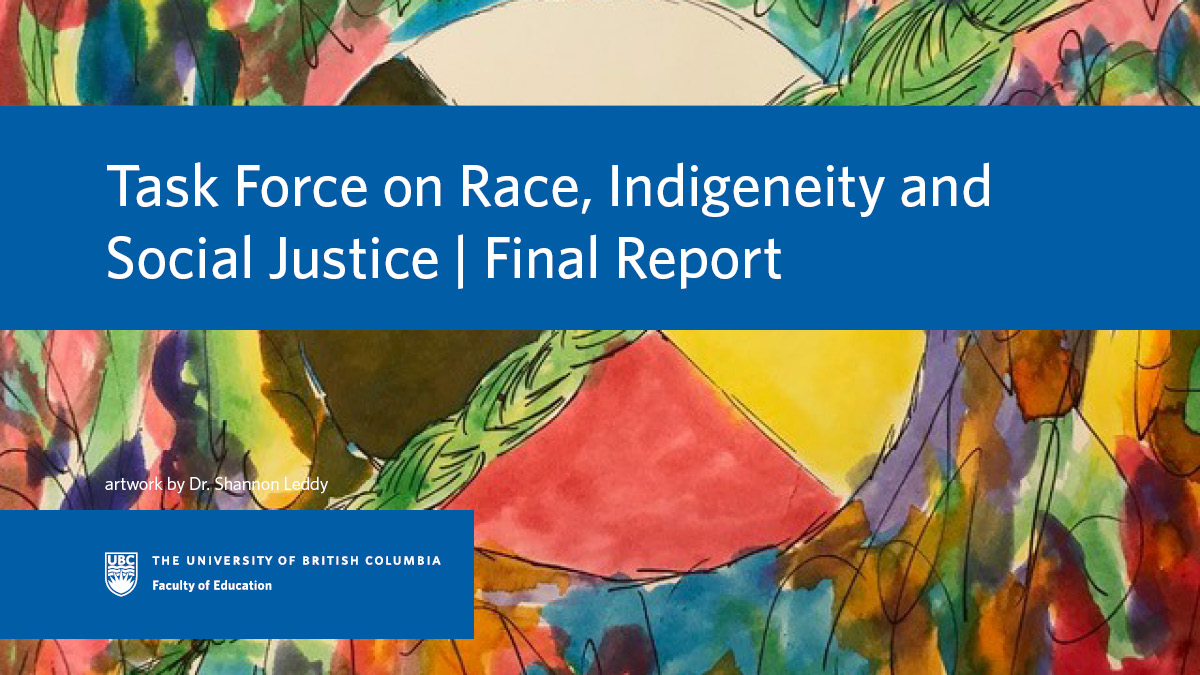June 28, 2021
The Faculty of Education’s Task Force on Race, Indigeneity and Social Justice has delivered its final report, which includes 12 clusters of themed recommendations, to Dean Blye Frank earlier today. The report identifies barriers that prevent or discourage the realization of equity, diversity, inclusion and decolonization for Indigenous and racialized people, as well as for people from other equity-deserving groups.
“I offer my sincere thanks to all members of the Task Force, most especially to Co-chairs Dr. Jan Hare and Dr. Marianne McTavish,” says Dr. Blye Frank, Dean of the Faculty of Education and recipient of the report and recommendations. “We all have an obligation to engage in work that dismantles racist and oppressive structures and decolonizes our institutions and processes. As a Faculty of Education, we have a special obligation to ensure that we do not reproduce racist, inequitable, or oppressive structures and attitudes that might be passed along to the teacher-candidates, educators and other professionals in our programs and communities.”
The Task Force was formed as a means to address and respond to two recent external reviews, both of which identified equity and inclusion issues, as well as racism, within the Faculty of Education’s programs and practices. The Task Force comprised 11 members, including staff and faculty members representing all ranks and a variety of equity-deserving groups, from both campuses. Through a comprehensive series of interviews, anonymous surveys, and focus groups, the Task Force gathered evidence from students, alum, staff and faculty members that clearly demonstrated institutional and individual racism within the Faculty of Education. A fulsome set of recommendations, written collaboratively by Task Force members, will guide the Faculty’s work in addressing the challenges.
The recommendations are clustered into four thematic areas, with specific action items embedded within each cluster. The recommendations and related action items derive from and are supported by the data gathered from focus groups, surveys and interviews.
Recommendations from the Report of the Task Force
Theme 1: Student recruitment, retention and success
- Provide, and improve access to, on-going, high-quality, relevant mentorship and guidance programs for Indigenous and racialized students at graduate and undergraduate levels.
- Provide scholarships and funding that address the specific needs, achievements and contributions of racialized and Indigenous communities, with attention to intersectionality (gender, sexual orientation, income and more).
- Provide, augment and promote academic counselling and supports that focus on retention and successful completion for racialized and Indigenous students, as well as lead to pathways of employment.
- Improve and expand mental health, counselling, support and well-being resources for racialized and Indigenous students.
Theme 2: Staff and faculty recruitment, retention, development and advancement
- Diversify practices and voices at all stages of the recruitment process, including the selection, interview and onboarding stages.
- Create more opportunities for mentorship, career counselling and training.
- Recognize and adequately compensate Indigenous and racialized staff and faculty for devoting emotional and invisible labour to activities that are beyond the regular scope of their work.
Theme 3: Curricula, research, pedagogy and learning
- Coordinate and deliver events and programs highlighting the work of Indigenous and racialized scholars, educators and community members, allowing them to network and showcase their research, learnings and methodologies.
- Re-evaluate and redesign the curriculum to modify the content and approach to anti-racism, Indigenization and post-colonialism.
Theme 4: Culture, climate, change processes and well-being
- Build more transparent, accountable and effective reporting systems for incidents concerning bias, discrimination and racism in order to increase access to and participation in the reporting process.
- Prioritize taking concrete actions to implement change processes, such as increased transparency and accountability.
- Continue and enhance awareness-raising and education on race and Indigenous issues through courses, workshops, training, conferences and seminars.
- Create a culture of inclusion within the Faculty of Education in which all (particularly BIPOC groups) feel included and safe to express their authentic selves.
Through its acceptance of the report of the Task Force, the Faculty of Education renews its commitment to enacting anti-racism, anti-oppression, equity, diversity, inclusion, and decolonizing practices in its research, teaching and learning; in its recruitment, retention, and advancement; and in its culture, climate, and wellbeing. The Faculty of Education’s goal is to model and lead action on social justice within the academic and education communities.
